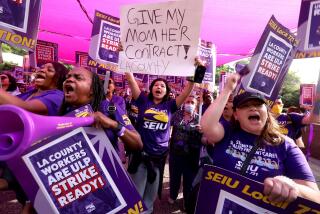Minnesota State Workers Prepare to Strike
- Share via
ST. PAUL, Minn. — Two unions representing nearly 28,000 Minnesota state workers have voted overwhelmingly to go on strike, and Gov. Jesse Ventura has ordered the National Guard to be ready to fulfill vital functions if they do.
The walkout deadline was pushed from Sept. 17 to Oct. 1 because of the terrorist attacks, which also have tempered some support for a strike.
Last-ditch talks resume today on two-year contracts for the workers, who make up more than half of the state work force. Their contracts expired June 30.
In landslide votes a few weeks ago, members of the American Federation of State, County and Municipal Employees Council 6 and the Minnesota Assn. of Professional Employees gave the go-ahead for strikes.
But since the Sept. 11 terrorist attacks, even rank-and-file members who are prepared to strike acknowledge that a few of their co-workers are having second thoughts.
“Members are kind of all over the board as to whether we go forward or not,” said Lyn Crosby, a 34-year state employee and MAPE member who works in the Department of Human Services.
“As an organization, I believe the drive is still there. We’re not going to take a bad package just because of the national tragedy,” Crosby said.
AFSCME member Paul Bissen hopes union leaders don’t back down, but he senses uneasiness.
“We’ve had a few people who have said maybe it’s not appropriate right now,” said Bissen, a road and bridge inspector for 17 years.
At issue for both unions are pay and proposed changes to health benefits. The state offered across-the-board increases of 2.5% this year and next for AFSCME, and 2% a year for MAPE. AFSCME’s last contract proposal sought across-the-board increases of 6.5% for each of two years. MAPE sought 6.3% this year and 4.2% next year.
The average gross salary for an AFSCME member is $30,000; for MAPE members, it’s $49,300.
If either union walks off the job, it would be the first major strike of Minnesota government in two decades.
The usually outspoken Ventura, who campaigned on a platform of fiscal austerity, says the state has made a fair offer. He hasn’t injected himself into the negotiations, saying he would rather leave it to his employee relations commissioner.
Ventura spokesman John Wodele said he’s not aware of any law that would allow the governor to block a strike.
Prison guards, who are AFSCME members, are barred from striking. But other services would be affected.
A walkout would slow work in the state crime lab and for driver’s license tests and renewals, birth certificates, death certificates and adoption records. Processing of tax collections and disbursements would have to be done by the 10% of nonunion workers in the Revenue Department. Welfare workers who deal directly with recipients are county employees.
Janitors, groundskeepers, clerks and food service workers at some state colleges could be idled.
State 911 operators who take emergency calls from cell phones would be eligible to strike, but state troopers would fill in, the state’s public safety commissioner says.
Two weeks ago, about 1,000 of Minnesota’s 12,100 National Guard members spent two days learning to care for vulnerable patients in the state’s five veterans homes and 108 community-based residences. They would offer basic help but not deliver medical care, said Maj. Gary Olson.
He said strike duty shouldn’t detract from any national call-up for possible military action.
The prospect of war and the state of the economy make retired teacher Jean Foley, 66, uncomfortable with the idea of a strike.
“They should wait,” said Foley, of Shoreview, who sided with the state workers before the terrorist attacks. “There’s too many people unemployed and too much patriotism. The world has definitely changed for me.”
More to Read
Sign up for Essential California
The most important California stories and recommendations in your inbox every morning.
You may occasionally receive promotional content from the Los Angeles Times.













